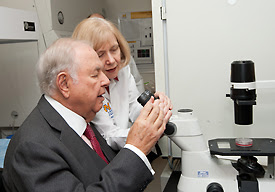One of the oddest of the 613 commandments offered in the Torah is found in this week’s Torah portion. On Shabbat morning, Jews all over the world will hear the words of Va’etchanan read aloud, including the commandment that we are to “to love God with all your heart and with all your soul and with all your might.” Even young children pick up on the fact that it’s odd for God to command us to love God. After all, love is a feeling and commanding a human being to have an emotion seems strange.
However, there are ways for us to express our love for God that transcend our emotions. We can love God in physical ways as well. Our actions toward the betterment of people’s lives are a reflection of our loving relationship with the Divine. If we believe that God created humans and we were partners in the creation of the world, then we have a responsibility to help other humans be healthy and live long lives.
In his commentary on the Torah, Rashi explains that “with all your heart” means that we should serve God with all our powers for goodness, compassion and charity.
Last night I had the pleasure to learn from one of the smartest people I’ve ever met. Dr. Eva Feldman, of the Taubman Institute at the University of Michigan, is using her knowledge, talent and heart to change the world for the better.
Feldman, a soft-spoken professor of neurology at the University of Michigan’s School of Medicine, has made significant contributions to the fight against ALS (Lou Gehrig’s Disease) and Diabetes in a very short period of time. Last night, she explained to a living room full of some of Metro Detroit’s young adults how her clinical trial of a stem cell therapy for ALS has allowed dozens of patients to walk better.
A. Alfred Taubman, the Michigan shopping mall magnate and mega-philanthropist, helped create the Taubman Medical Research Institute with a $22 million endowment in 2007 and named Feldman as the institute’s first director in January 2008. (Taubman is the University of Michigan’s largest individual donor, with total giving of more than $142 million including $100 million specifically for innovative medical science.)
Three years ago, Dr. Feldman and the Taubman Institute educated citizens in Michigan about the importance of stem cell research in the study and treatment of disease, which led to voters approving a constitutional amendment lifting restrictions on stem cell research. As a result of the election, the Taubman Institute opened the first core facilities in Michigan to derive embryonic stem cell lines (one of the few in the nation).
Dr. Eva Feldman is a pioneer in this field of medical science, but she has also learned to be a quiet fighter. She has to fight against politicians who seek to make her research illegal and she has to fight against those who claim that what she is doing is unethical. Some even accuse her of playing God. There are many who cite their religious beliefs to criticize Dr. Feldman’s work, but I am convinced that her research comes from a place of deep compassion for humanity. Dr. Feldman is motivated to find ways to treat and cure disease. She does this through the power of modern scientific and medical innovation. She explained to our group that she is pro-life because she uses the leftover frozen embryos created for couples using IVF to have children. These embryos would have been destroyed in a garbage disposal, but Dr. Feldman is able to use these stem cell lines to learn more about genetic diseases, create treatments for suffering patients, and help find cures for such life-threatening conditions as cancer, ALS, and Diabetes.
We were all created in the image of God and we owe it to each other to use modern science and medical innovation to benefit the lives of God’s creatures. Using stem cells to fight (and potentially cure) diseases isn’t playing God, but it is a form of loving God. Rebbe Levi Yitzchak of Berditchev taught that it can be determined if a person really loves God by the love they bear toward others. Dr. Eva Feldman strikes me as this type of person.
Shabbat Shalom.


